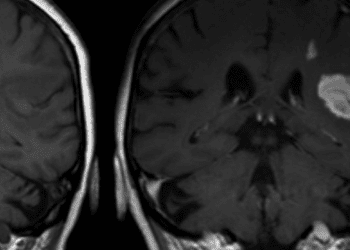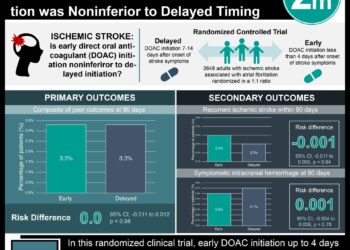Primary thromboembolism prophylaxis may be effective in advanced cancer
1. In a randomized controlled trial of over 300 patients with advanced pancreatic cancer treated in the outpatient setting, the use of a combined regimen of chemotherapy and prophylactic enoxaparin demonstrated significant reduction in the incidence of symptomatic venous thrombotic events compared to chemotherapy alone.
2. The addition of prophylactic enoxaparin did not result in an improvement in progression-free or overall survival compared to chemotherapy alone.
Evidence Rating Level: 1 (Excellent)
Study Rundown: Due to their hypercoagulable state, patients with cancer are at greatly increased risk of venous thromboembolic events (VTEs). Advanced pancreatic cancer (APC) is associated with a one of the highest incidences of VTE, particularly if patients are undergoing systemic chemotherapy treatment. VTEs in this population result in impaired quality of life, delayed cancer treatment, increased hospitalizations, and increased medical expenses. While prophylactic anticoagulation is recommended for hospitalized patients, the role of VTE prophylaxis in the outpatient setting is unclear. The purpose of this randomized controlled trial was to evaluate the efficacy of anticoagulant use in the primary prevention of VTEs among outpatients with APC starting first-line chemotherapy. The study randomized patients with APC to either the combination treatment (first-line chemotherapy and enoxaparin) or chemotherapy alone. At the conclusion of this trial, the patients in the combination therapy group demonstrated significantly lower incidence of symptomatic VTEs compared to the chemotherapy-alone group without increasing major bleeding events. The highest reduction in VTEs was observed within the first 3 months. Furthermore, there was no difference in progression-free or overall survival between the 2 groups. The results of this study support the use of outpatient prophylactic enoxaparin for the primary prevention of VTEs in patients with advanced pancreatic cancer. However, the study is limited by the open and non-blinded design, which may limit the validity of the study. Additional large, randomized trials are required to confirm the protective effect in patients with other primary cancers.
Click to read the study in JCO
Relevant Reading: Randomized comparison of low molecular weight heparin and coumarin derivatives on the survival of patients with cancer and venous thromboembolism
In-Depth [prospective study]: This study was a prospective, open-label, randomized, multicenter trial of patients with APC starting treatment with outpatient chemotherapy. Eligibility criteria included outpatients with histologically-confirmed APC, no previous treatment with radiotherapy or chemotherapy, no VTEs within the past 2 years, and no pre-existing anticoagulation indications or contraindications. A total of 312 patients were enrolled and randomly assigned to chemotherapy with concomitant prophylactic enoxaparin or chemotherapy alone. Primary endpoints were the first event rate of symptomatic VTEs within 3 months after randomization, while secondary outcomes included median progression-free survival (PFS), median overall survival (OS), overall symptomatic VTEs within 3 months, and overall major bleeding rate. At the conclusion of the trial, there was a significant difference in the event rate of symptomatic VTEs at 3 months favoring combination therapy compared to chemotherapy alone (HR: 0.12; 95% CI: 0.03-0.52; p = 0.001). There was no increase in the incidence of major bleeding events between the 2 groups (HR: 1.4; 95% CI: 0.35-3.72; p = 1.0). Overall, symptomatic VTEs occurred in 15.1% and 6.4% of the chemotherapy-only and combination groups, respectively (HR: 0.40; 95% CI: 0.19-0.83; p = 0.01). No significant differences were found between 2 two groups with respect to median PFS (p=0.64) or OS (p=0.44).
Image: CC/Wikimedia Commons/Yale Rosen
©2015 2 Minute Medicine, Inc. All rights reserved. No works may be reproduced without expressed written consent from 2 Minute Medicine, Inc. Inquire about licensing here. No article should be construed as medical advice and is not intended as such by the authors or by 2 Minute Medicine, Inc.







